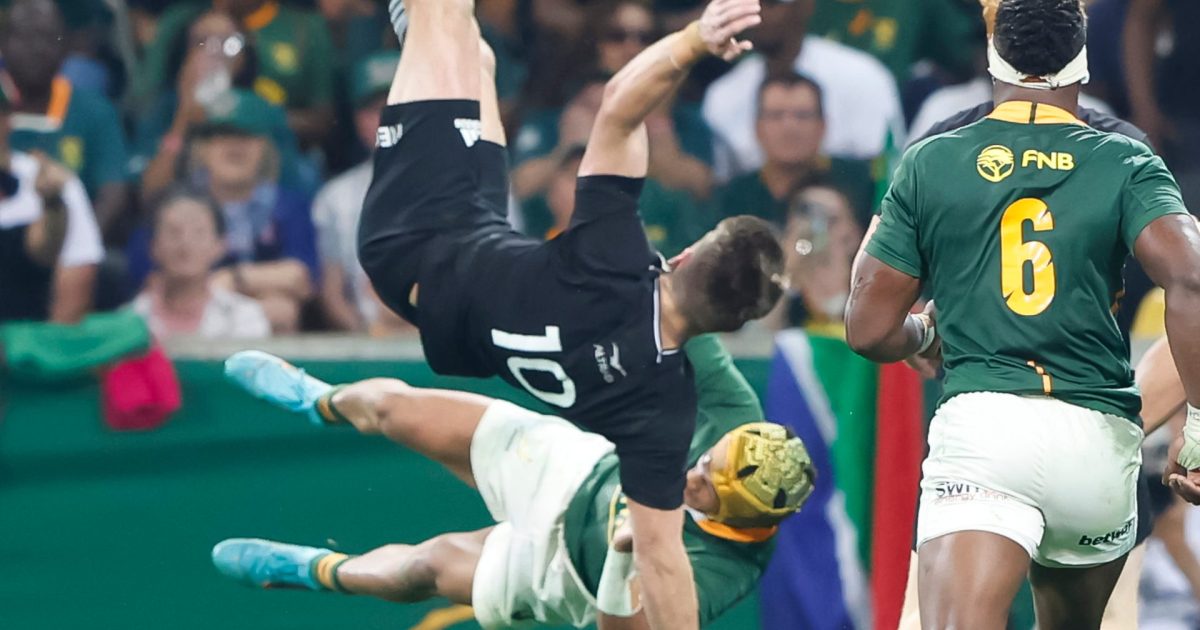'That last one was very dangerous': All Blacks speak out over challenge on Beauden Barrett

All Blacks halfback Aaron Smith and head coach Ian Foster have questioned the tactics used by the Springboks in the aerial contest zone in the wake of their 26-10 defeat in South Africa.
A hair-raising challenge on first five-eighth Beauden Barrett late in the game by right wing Kurt-Lee Arendse saw the All Black No 10 cartwheel and land dangerously on the ground head first.
The rookie Springbok was red-carded by referee Angus Gardner for the challenge after deliberation from the match officials.
It was a tough night for the All Blacks backfield trying to field high kicks as a number of balls were dropped, including one in the eighth minute which led to a try to Arendse.
Smith said his side need to better in the aerial contests but that the tactics were ‘borderline’ that need to be looked at.
“Our ability to diffuse their bombs is something that we need to fix, but their tactics there are a little bit borderline,” Smith said.
“To see Beauden Barrett do a full flip is pretty scary. That is a part of the game that needs to be looked at a little bit. We have to do better to protect our jumpers.
“Because as we saw, we stopped them around the 30-metre line and they just put a bomb up. But that works for them.”
All Blacks head coach Ian Foster was also displeased with the way that the Springboks played in the air which led to frustration for his side.
He said it was an area that they would look at to find ways to stop ‘bodies being chucked up’ to disrupt the catch zone.
“It is a big part of their game,” Foster said of the aerial contests on Sky Sport.
“We’re going to have a look at them chucking bodies in the air, we were pretty frustrated with that.
“The one in the first half we weren’t very happy with, and certainly the last one, was very dangerous.
“But that’s part of the game we’ve got to sort out. If they’re going to just chuck bodies up, and just throw people up in the air, it’s a very hard thing to deal with. That’s the game. We missed one and they scored, and that got them the early momentum.”
The aerial game was one aspect of the test where the All Blacks were challenged and struggled to find answers, leading to questions around whether not playing South African teams in Super Rugby has left the squad underdone and underprepared for a different style.
The breakdown and overall physicality of the Springboks seemed to be too much on the day for the All Blacks to overcome and get into their game.
Smith didn’t think it mattered in this instance having just played an Ireland team that was equally as good in those areas. They were prepared for the Springboks game and got what they were expecting from them.
“I wouldn’t say so, I think the Irish played probably a more up tempo, physical game as well,” Smith said.
“It wasn’t a big shock, but I think our ability around the breakdown as I said, I’m beating the same drum.
“We knew what was coming, they are big men. I thought our forwards tonight were outstanding.
“Their ability to stop their maul, our scrum could be better but you know you give the refs a coin toss at the scrum, anything can happen.”














































































